Babies are known for their erratic sleep patterns, which can often leave parents feeling exhausted and sleep-deprived. However, sometimes a baby can fall into a deep sleep that seems impossible to wake them up from.
Baby in deep sleep won’t wake up which can cause worry and concern for parents. In this article, we will explore the topic of babies in deep sleep and provide information on when it is appropriate to wake them and how to do so safely.
Understanding Baby Sleep Cycles is crucial to understanding why a baby maybe hard to wake up from a deep sleep. Babies have shorter sleep cycles than adults, and they spend more time in the REM stage of sleep.
During the REM stage, the baby’s body is still and relaxed, making it harder to wake them. However, it is essential to recognize the difference between deep sleep and an underlying medical issue that may cause the baby to be difficult to wake up.
Signs of a Deep Sleeping Baby can include a lack of movement, breathing that is slow and steady, and no response to noise or touch. While it is normal for babies to spend a significant amount of time in deep sleep, it is crucial to monitor their breathing and ensure that they are not in any distress.
Understanding when to wake a baby from deep sleep and how to do so safely can help parents ensure their baby’s health and well-being.

Key Takeaways
- Babies spend more time in the REM stage of sleep, making it harder to wake them during this time.
- Signs of a deep-sleeping baby can include a lack of movement, slow breathing, and no response to noise or touch.
- It is essential to monitor a baby’s breathing and ensure they are not in distress while in deep sleep. If necessary, parents can wake a sleeping baby safely by using gentle methods.
1. Understanding Baby Sleep Cycles

Babies have a unique sleep pattern that is different from adults. Understanding baby sleep cycles can help parents identify when their baby is in deep sleep or REM sleep.
This can be helpful in determining whether the baby is sleeping soundly or if there is a problem that needs attention.
Newborns sleep for most of the day and night, but their sleep is divided into several short periods. As they grow, they will start to sleep for longer periods at night and have fewer naps during the day.
A baby’s sleep cycle involves two stages: non-REM sleep and REM sleep. Non-REM sleep is divided into three stages, and babies spend most of their sleep time in this stage.
During this stage, the baby’s body is relaxed, and their breathing and heart rate are slow and steady.
Deep sleep is the first stage of non-REM sleep and is the most restorative stage of sleep. During this stage, the baby is difficult to wake up, and their body is repairing and regenerating.
This stage is essential for growth and development.
REM sleep is the second stage of non-REM sleep and is characterized by rapid eye movement. During this stage, the baby’s brain is active, and their body is relaxed.
This stage is important for brain development and memory consolidation.
Babies spend about 50% of their sleep time in REM sleep, but the amount of time spent in each stage of sleep varies depending on the age of the baby.
In summary, understanding a baby’s sleep cycle is crucial for parents to ensure their baby is sleeping soundly and growing properly. Deep sleep is the most restorative stage of sleep and is essential for growth and development.
REM sleep is important for brain development and memory consolidation.
2. Signs of a Deep Sleeping Baby
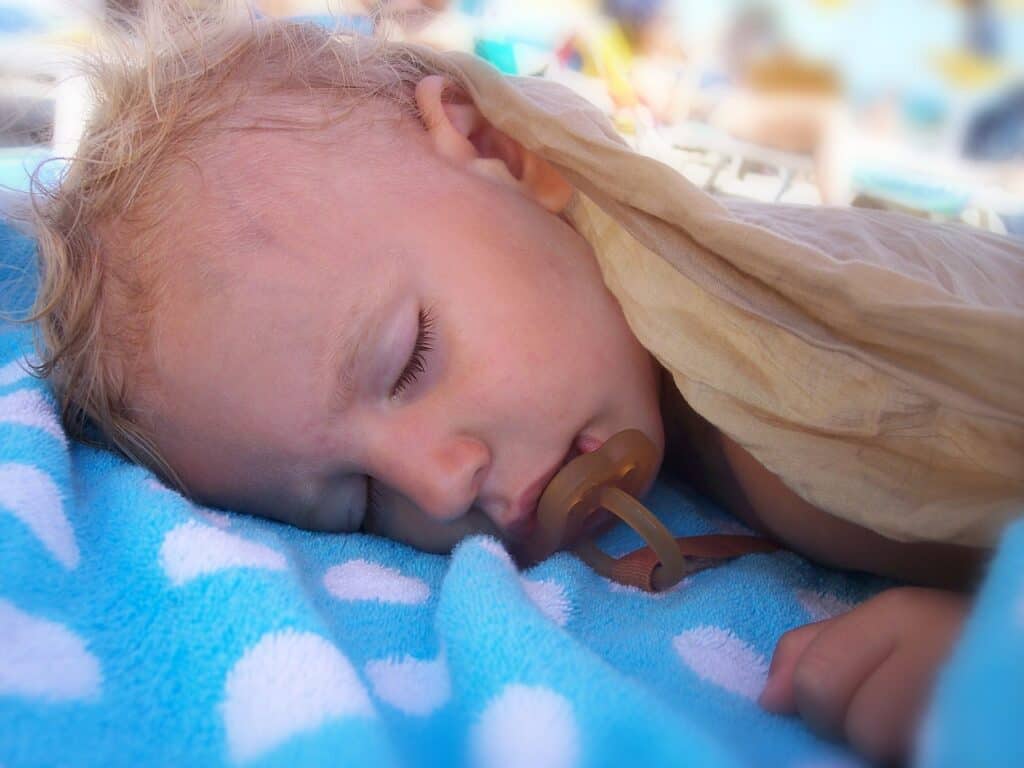
Observing a baby in deep sleep can be a delightful experience for parents. However, it can also be a cause for concern if the baby won’t wake up.
Understanding the signs of a deep-sleeping baby can help parents determine whether their baby is sleeping soundly or if there is a cause for alarm.
Here are some signs to look out for when observing a deep-sleeping baby:
- Breathing: A deep-sleeping baby will have slow and regular breathing. It may even appear as if the baby has stopped breathing altogether, but this is normal during deep sleep.
- Muscle tone: During deep sleep, a baby’s muscles will be relaxed, and their limbs may appear floppy or loose.
- Heart rate: A baby’s heart rate will slow down during deep sleep, and it may be difficult to detect a pulse.
- Lack of response: A deep-sleeping baby will be unresponsive to external stimuli, such as noise or touch.
- REM sleep: Rapid Eye Movement (REM) sleep is a sign of deep sleep in babies. During REM sleep, a baby’s eyes will move rapidly under their closed eyelids.
It is important to note that newborns and infants spend a significant amount of time in deep sleep. In fact, babies spend more time in deep sleep than adults do.
However, if a baby is difficult to wake up, it may be a cause for concern. Parents should monitor their baby’s sleeping patterns and seek medical attention if they notice any changes or abnormalities.
3. Importance of Letting a Baby Sleep

Sleep is crucial for a newborn baby’s growth and development. Babies spend most of their time sleeping, and it is important to ensure that they get enough rest.
A peaceful night’s sleep is essential for both the baby and the parents.
Newborns need around 14-17 hours of sleep each day, while infants require 12-15 hours. When a baby is in deep sleep, their body is in a state of rest and repair.
During this time, the body produces growth hormones, which are essential for the baby’s physical and mental development.
A good sleeper is a healthy baby. When a baby is well-rested, they are more likely to self-soothe and fall asleep on their own.
This means that they will be able to sleep through the night without waking up frequently, which is important for the baby’s health and the parents’ well-being.
It is important to let a baby sleep without interruption as much as possible. When a baby is in deep sleep, they are less likely to wake up.
If a baby is awakened during this time, it may become fussy and difficult to soothe back to sleep.
In conclusion, letting babies sleep is essential for their growth and development. A good night’s sleep is important for both the baby and the parents.
It is important to ensure that the baby is well-rested and able to self-soothe, which will lead to a peaceful night’s sleep for everyone.
4. When to Wake a Sleeping Baby
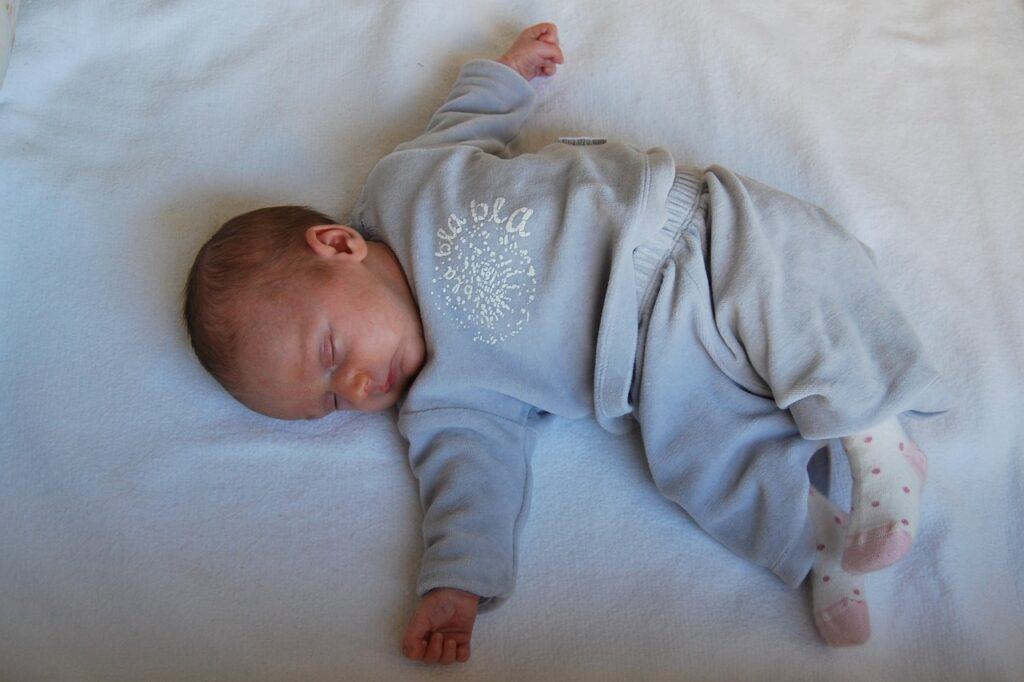
Babies spend a significant amount of time sleeping, and it is essential to ensure they get enough rest. However, there are times when you may need to wake a sleeping baby.
Knowing when to wake a baby is crucial to ensure their health and well-being.
Newborns typically sleep for 16 to 17 hours a day, and they wake up every few hours to feed. As they grow, babies sleep for shorter periods and wake up less frequently.
By the time they are six months old, most babies sleep for around 14 hours a day, with two or three naps during the day.
It is generally not necessary to wake a sleeping baby unless there is a specific reason to do so. Here are some situations when you may need to wake a sleeping baby:
- Feeding: Newborns need to eat frequently, and they may not wake up on their own to feed. It is important to wake them up every two to three hours to ensure they are getting enough nutrition.
- Medication: If your baby is on medication that needs to be given at specific times, you may need to wake them up to administer it.
- Doctor’s appointment: If you have a doctor’s appointment for your baby, you may need to wake them up to get them ready and to ensure they are not hungry during the appointment.
- Travel: If you are traveling with your baby, you may need to wake them up to ensure they are not hungry or uncomfortable during the journey.
It is important to note that babies need a lot of sleep to grow and develop. If there is no specific reason to wake a sleeping baby, it is best to let them sleep.
However, if you are concerned about your baby’s sleeping patterns or if they are not waking up for feeds, it is important to speak to your doctor.
In summary, knowing when to wake a sleeping baby is crucial to ensure their health and well-being. While it is generally not necessary to wake a sleeping baby, there are specific situations when it may be necessary.
It is important to ensure your baby is getting enough sleep and to speak to your doctor if you have any concerns.
5. How to Wake a Sleeping Baby
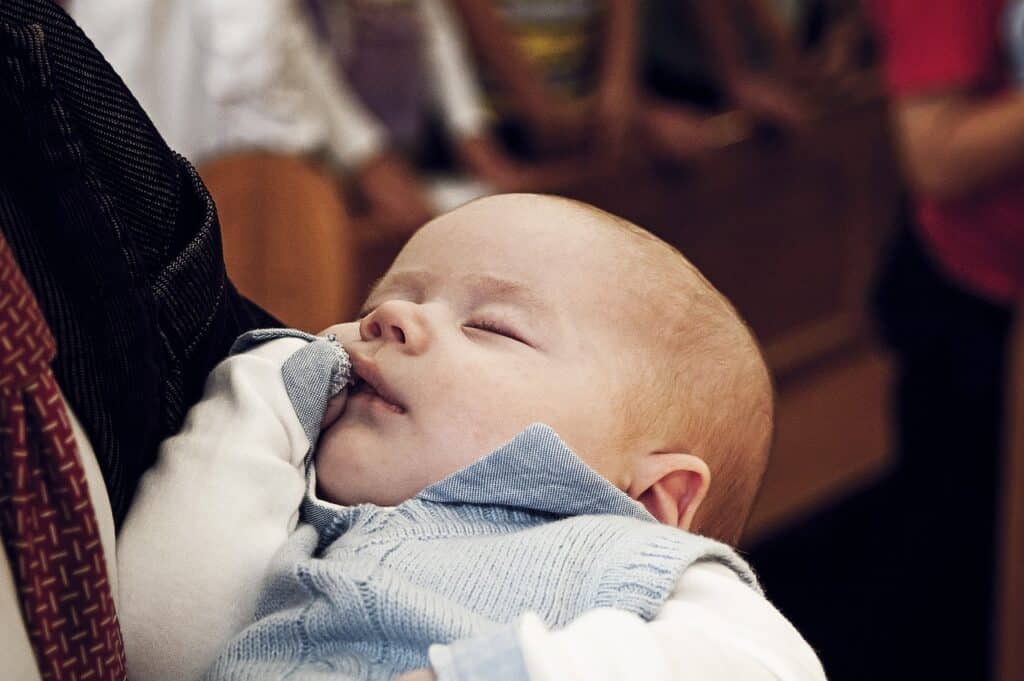
Sometimes, babies fall into a deep sleep, and can be difficult to wake up. While it’s important to let babies sleep, there are times when you may need to wake them up for feeding or other reasons.
Here are some tips on how to wake a sleeping baby:
Talking and Singing
Talking or singing softly to a sleeping baby can be an effective way to wake them up. The sound of your voice can be soothing and reassuring, and it may be enough to rouse them from their slumber.
Bath
A warm bath can also be a gentle way to wake up a sleeping baby. The warm water and gentle movements can help stimulate their senses and bring them out of their deep sleep.
Pacifier
If your baby uses a pacifier, gently inserting it into their mouth can help wake them up. The sucking motion can stimulate their senses and help them become more alert.
Swaddled
If your baby is swaddled, gently unwrap them to expose their arms and legs. This can help them become more aware of their surroundings and may make it easier to wake them up.
It’s important to remember that babies need a lot of sleep, and it’s normal for them to fall into deep sleep from time to time. However, if you’re concerned about your baby’s sleeping habits, it’s always a good idea to talk to your pediatrician.
Also take a look at Is Nested Bean Safe
6. Sleep Schedule and Routine
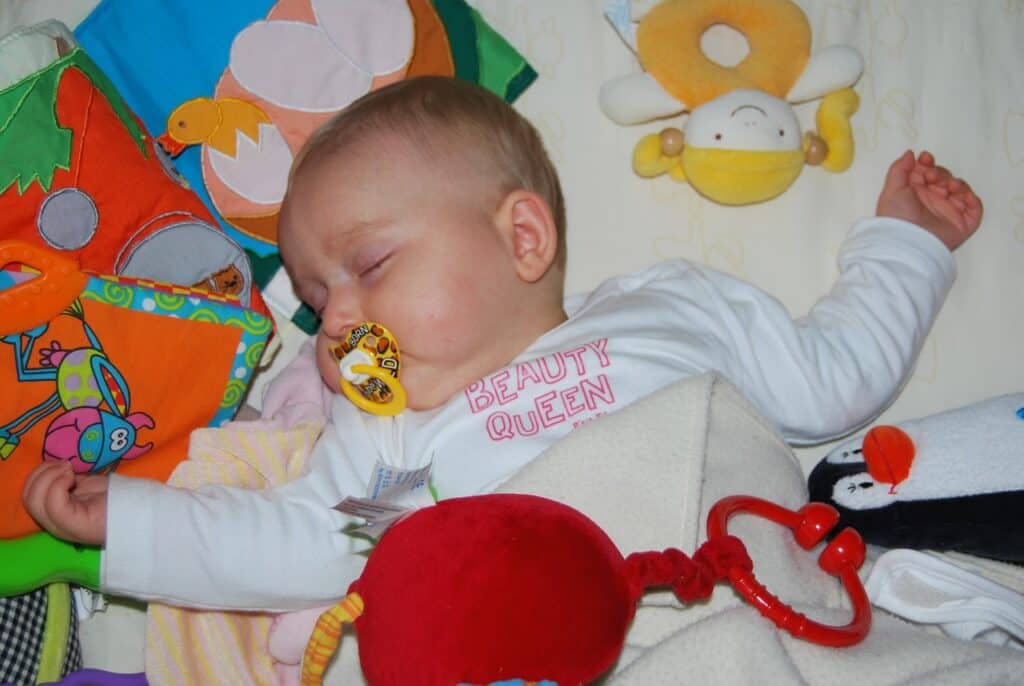
Establishing a sleep schedule and routine for a baby is crucial for their overall health and well-being. Newborns typically sleep for 16-17 hours a day, but as they grow, their sleep patterns change.
Babies need a consistent sleep schedule to help regulate their circadian rhythm and promote healthy sleep habits.
It is recommended that parents establish a consistent sleep schedule for their baby, including both naps and bedtime. A regular routine can help the baby feel more secure and comfortable, making it easier for them to fall asleep and stay asleep.
Parents should aim to create a calming and relaxing environment in the baby’s sleep space, with dim lighting and a comfortable temperature.
It is important to note that every baby is different and may have varying sleep needs. Some babies may require more or less sleep than others, and their sleep patterns may be irregular during the first few months of life.
Parents should monitor their baby’s sleep cues, such as rubbing their eyes or becoming fussy, to determine when they are tired and ready for sleep.
Parents should also establish a consistent bedtime routine to help their baby wind down before sleep. This can include a bath, a story, or a lullaby.
It is important to keep the routine consistent, even when traveling or during irregular schedules, to help the baby maintain healthy sleep habits.
In summary, a consistent sleep schedule and routine can help promote healthy sleep habits for babies. Parents should monitor their baby’s sleep cues and establish a calming sleep environment to help their baby sleep better.
7. Potential Sleep Disruptions

It is not uncommon for babies to experience disruptions in their sleep, which can result in them not waking up easily. Here are some potential causes of sleep disruptions in babies:
Teething
Teething can be a painful process for babies, and it can disrupt their sleep. Babies may wake up more frequently during the night or have difficulty falling asleep due to the discomfort caused by teething.
Jaundice
Jaundice is a common condition in newborns that can cause them to feel sleepy and lethargic. Babies with jaundice may have difficulty waking up for feedings and may sleep for longer periods than usual.
Discomfort
Babies may experience discomfort from a variety of sources, such as a dirty diaper, tight clothing, or an uncomfortable sleeping surface. This discomfort can disrupt their sleep and make it difficult for them to wake up.
Night Terrors and Nightmares
Night terrors and nightmares can occur in babies and young children and can cause them to wake up crying or screaming. These episodes can be frightening for both the baby and the parents, and they may disrupt the baby’s sleep.
Sleepwalking
Sleepwalking is a rare occurrence in babies, but it can happen. Babies who sleepwalk may be difficult to wake up and maybe disoriented when they do wake up.
Developmental Leap and Growth Spurt
Babies go through developmental leaps and growth spurts, which can disrupt their sleep patterns. During these periods, babies may wake up more frequently during the night or have difficulty falling asleep.
Sleep Apnea
Sleep apnea is a condition in which a person’s breathing is repeatedly interrupted during sleep. This can cause the person to wake up frequently during the night and feel sleepy during the day.
Babies with sleep apnea may be difficult to wake up and may appear lethargic during the day.
In conclusion, there are many potential causes of sleep disruptions in babies that can make it difficult for them to wake up. It is important for parents to be aware of these potential causes and to seek medical attention if they are concerned about their baby’s sleep patterns.
8. Health Concerns and When to Seek Medical Attention
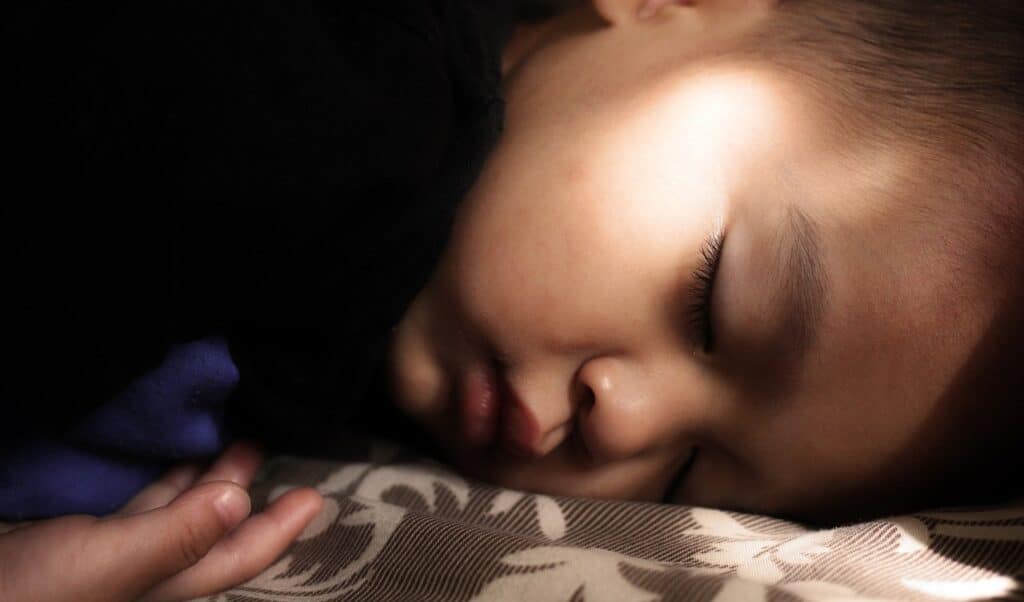
While it is common for babies to sleep deeply and be difficult to wake up, there are certain situations where it is important to seek medical attention. Some potential health concerns include:
Infection
If a newborn or infant is difficult to wake up and also has a fever, it could be a sign of infection. Other symptoms of infection can include a rash, vomiting, or diarrhea.
It is important to seek medical attention right away if a baby has a fever or other signs of infection.
Breathing Issues
If a baby is sleeping deeply and their breathing seems irregular or labored, it could be a sign of a respiratory problem. This could be due to a variety of factors, such as an obstruction in the airway or an infection.
If a baby is having difficulty breathing, it is important to seek medical attention immediately.
Low Blood Sugar
If a baby is sleeping deeply and also seems lethargic or unresponsive when awake, it could be a sign of low blood sugar. This is more common in babies who are not getting enough to eat, and can be dangerous if left untreated.
If a baby seems unresponsive or is not waking up to hunger cues, it is important to seek medical help.
SIDS
Sudden Infant Death Syndrome (SIDS) is a rare but serious condition that can occur during sleep. While the exact cause is unknown, there are certain risk factors that can increase the likelihood of SIDS.
If a baby is sleeping deeply and also has other risk factors for SIDS, such as sleeping on their stomach or being exposed to smoke, it is important to talk to a healthcare provider about ways to reduce the risk.
Overall, if a baby is difficult to wake up and also has other symptoms or risk factors, it is important to seek medical attention. A pediatrician or other healthcare provider can help determine if there is an underlying illness or issue that needs to be addressed.
9. Caring for a Sleeping Baby

Caring for a sleeping baby can be a delicate task, especially when the baby is in deep sleep and won’t wake up easily. Here are some tips for parents and caregivers to ensure the baby’s safety and comfort while they sleep.
Swaddling
Swaddling is a technique that involves wrapping the baby snugly in a blanket to help them feel secure and calm. It can also prevent the baby from startling themselves awake with sudden movements.
However, it’s important to make sure the baby’s hips and legs are free to move to avoid hip dysplasia.
Hunger
Newborns and infants have small stomachs that require frequent feedings. If the baby is sleeping for an extended period, it’s important to wake them up for feeding.
Hunger can cause the baby to become irritable and have trouble sleeping.
Overstimulation
Overstimulation can make it difficult for a baby to fall asleep or stay asleep. Parents and caregivers should create a calm and quiet environment for the baby to sleep in.
Avoid loud noises, bright lights, and excessive movement.
Exhaustion
Babies can become overtired and have trouble falling asleep if they are kept awake for too long. It’s important to establish a consistent sleep routine and monitor the baby’s sleep cues, such as rubbing their eyes or yawning.
Premature Babies
Premature babies or preemies may have different sleep needs and require specialized care. It’s important to consult with a healthcare provider or sleep consultant for guidance on caring for a premature baby.
Overall, caring for a sleeping baby requires attentiveness and a gentle touch. By following these tips, parents, and caregivers can help ensure that the baby sleeps soundly and safely.
Related Posts:
Frequently Asked Questions
Why is it difficult to wake a baby from deep sleep?
Babies have different sleep cycles than adults, and it can be difficult to wake them up during deep sleep. During deep sleep, a baby’s brain waves slow down, and their body is relaxed. This is a natural part of the sleep cycle, and it is important for their development.
What are the signs of deep sleep in babies?
During deep sleep, babies may be difficult to wake up. They may have a regular breathing pattern, and their eyes may be closed. Some babies may also have a slight twitching or jerking of their limbs during deep sleep.
What can cause a newborn to not wake up?
A newborn may not wake up if they are in a deep sleep, or if they are sick or have a medical condition. It is important to monitor a newborn’s sleep patterns and seek medical attention if they are difficult to wake up or if they are sleeping for long periods of time.
How can I help my baby wake up from a deep sleep?
If a baby is difficult to wake up from a deep sleep, parents can try gently stroking their face or feet, talking to them softly, or changing their diaper. It is important to avoid shaking or jostling a baby to wake them up, as this can be dangerous.
Is it normal for a baby to sleep deeply?
Yes, it is normal for babies to sleep deeply at times. Babies sleep for long periods of time, and they may spend a significant amount of time in deep sleep. However, if a baby is difficult to wake up or if they are sleeping for long periods of time, it is important to seek medical attention.
What are some tips for getting a newborn to wake up to eat?
If a newborn is difficult to wake up to eat, parents can try changing their diaper, gently rubbing their back, or talking to them softly. It may also be helpful to offer a small amount of milk or formula before attempting to feed them. If a newborn continues to have difficulty waking up to eat, it is important to seek medical attention.

Iesha is a loving mother of 2 beautiful children. She’s an active parent who enjoys indoor and outdoor adventures with her family. Her mission is to share practical and realistic parenting advice to help the parenting community becoming stronger.
